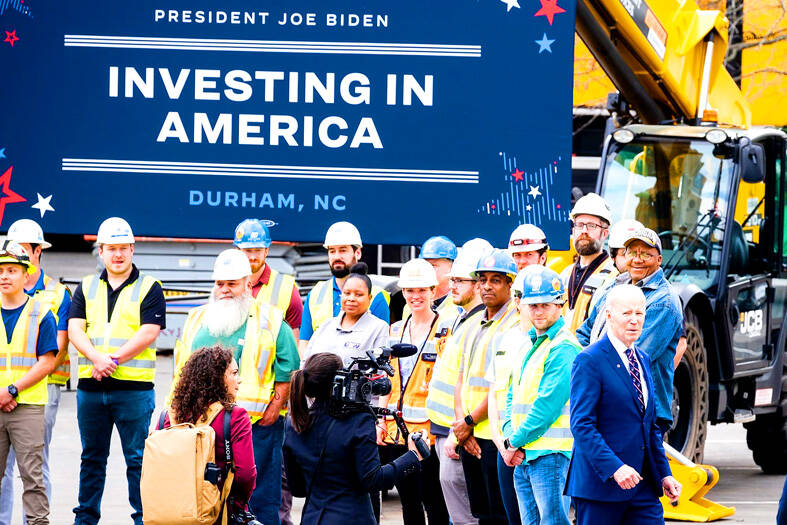Beijing has asked the US, Japan and the Netherlands to confirm the existence of an alleged agreement between the three countries to curb semiconductor exports to China, state media reported yesterday.
Beijing’s representatives issued the request during a regular meeting this week at the WTO, a state television broadcast said.
Representatives demanded that the three countries “notify the WTO of the agreement and subsequent measures, and [called] on the WTO to strengthen supervision of the measures.”

Photo: Bloomberg
Washington has in recent years attempted to cut Chinese companies out of supply chains that provide access to advanced chip technology, while urging its allies to adopt similar measures.
In October last year, Washington introduced new export controls in a bid to limit the ability of Chinese entities to purchase and manufacture high-end chips with possible military applications.
The Netherlands, a leading producer of components used to manufacture semiconductors, announced similar restrictions last month, followed closely by Japan.
China, which has sought in the past few years to achieve self-reliance in the semiconductor field, maintains that the curbs are designed to preserve US technological supremacy in the face of Beijing’s rise.
After Japan announced export controls last week, Chinese Ministry of Foreign Affairs spokesperson Mao Ning (毛寧) lambasted the decision as an attempt to “politicize, instrumentalize, and weaponize trade and technology issues.”
“With this type of action, they are harming others, but they are also harming themselves at the same time,” she said.
Moreover, Beijing has started to take reciprocal action, as Washington ramps up efforts to restrict the flow of advanced technology to China.
The nation’s top Internet regulator on Friday last week announced that it had launched an investigation into US firm Micron Technology Inc — a leading producer of memory chips — citing the need to “safeguard national security.”
“Both Chinese companies and foreign companies operating in China must abide by Chinese laws and regulations and must not endanger China’s national security,” Mao told a regular press conference on Monday.
Micron, which counts on mainland China for about 11 percent of its sales, said China’s investigation is not affecting its ability to deliver products.
“Micron’s product shipments, engineering, manufacturing, sales and other functions are operating as normal,” the company said on Monday. “Micron is committed to conducting all business with uncompromising integrity, and we stand by the security of our products and our commitments to customers.”
Additional reporting by Bloomberg

SEMICONDUCTORS: The German laser and plasma generator company will expand its local services as its specialized offerings support Taiwan’s semiconductor industries Trumpf SE + Co KG, a global leader in supplying laser technology and plasma generators used in chip production, is expanding its investments in Taiwan in an effort to deeply integrate into the global semiconductor supply chain in the pursuit of growth. The company, headquartered in Ditzingen, Germany, has invested significantly in a newly inaugurated regional technical center for plasma generators in Taoyuan, its latest expansion in Taiwan after being engaged in various industries for more than 25 years. The center, the first of its kind Trumpf built outside Germany, aims to serve customers from Taiwan, Japan, Southeast Asia and South Korea,

Gasoline and diesel prices at domestic fuel stations are to fall NT$0.2 per liter this week, down for a second consecutive week, CPC Corp, Taiwan (台灣中油) and Formosa Petrochemical Corp (台塑石化) announced yesterday. Effective today, gasoline prices at CPC and Formosa stations are to drop to NT$26.4, NT$27.9 and NT$29.9 per liter for 92, 95 and 98-octane unleaded gasoline respectively, the companies said in separate statements. The price of premium diesel is to fall to NT$24.8 per liter at CPC stations and NT$24.6 at Formosa pumps, they said. The price adjustments came even as international crude oil prices rose last week, as traders

POWERING UP: PSUs for AI servers made up about 50% of Delta’s total server PSU revenue during the first three quarters of last year, the company said Power supply and electronic components maker Delta Electronics Inc (台達電) reported record-high revenue of NT$161.61 billion (US$5.11 billion) for last quarter and said it remains positive about this quarter. Last quarter’s figure was up 7.6 percent from the previous quarter and 41.51 percent higher than a year earlier, and largely in line with Yuanta Securities Investment Consulting Co’s (元大投顧) forecast of NT$160 billion. Delta’s annual revenue last year rose 31.76 percent year-on-year to NT$554.89 billion, also a record high for the company. Its strong performance reflected continued demand for high-performance power solutions and advanced liquid-cooling products used in artificial intelligence (AI) data centers,

SIZE MATTERS: TSMC started phasing out 8-inch wafer production last year, while Samsung is more aggressively retiring 8-inch capacity, TrendForce said Chipmakers are expected to raise prices of 8-inch wafers by up to 20 percent this year on concern over supply constraints as major contract chipmakers Taiwan Semiconductor Manufacturing Co (TSMC, 台積電) and Samsung Electronics Co gradually retire less advanced wafer capacity, TrendForce Corp (集邦科技) said yesterday. It is the first significant across-the-board price hike since a global semiconductor correction in 2023, the Taipei-based market researcher said in a report. Global 8-inch wafer capacity slid 0.3 percent year-on-year last year, although 8-inch wafer prices still hovered at relatively stable levels throughout the year, TrendForce said. The downward trend is expected to continue this year,